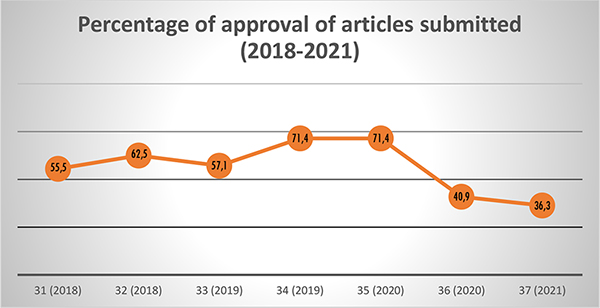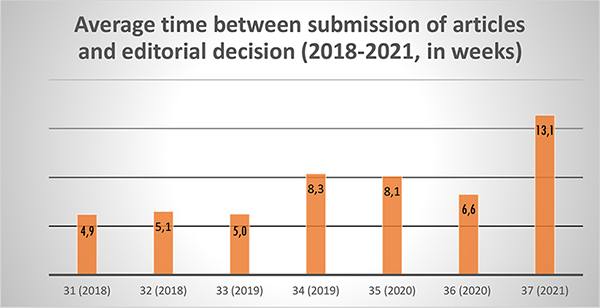Sobre la revista
Foco y alcance
La Revista Poiésis es una publicación semestral, de acceso abierto, del Programa de Postgrado en Estudios Contemporáneos de las Artes de la Universidad Federal Fluminense. Actuando en el campo ampliado de las artes, la Revista Poiésis tiene como objetivo la publicación de artículos, trabajos artísticos, traducciones y reseñas que traten de forma sustantiva las cuestiones pertinentes a la producción de las artes y del pensamiento crítico en la contemporaneidad. De acuerdo con su política editorial, Poiésis prioriza la publicación de trabajos inéditos derivados de investigaciones realizadas prioritariamente en el ámbito académico, sin excluir investigación, producciones y prácticas que ocurran en otros escenarios.
Con esa política, Revista Poiésis busca actuar como articuladora y propulsora de las ideas que orientan el Programa de Postgrado en Estudios Contemporáneos de las Artes de la Universidad Federal Fluminense, comprometido con la formación de artistas, profesores, educadores, historiadores y teóricos en el campo de las artes a partir de la percepción política y conceptual de que, en los ambientes cotidianos de la cultura contemporánea, las reflexiones y las prácticas en torno al fenómeno artístico necesitan ser articuladas a través de distintas esferas del conocimiento, permeadas por diferentes disciplinas.
La revista comenzó a publicarse a finales del año 2000 (ISSN 1517-5677) y en 2008 ganó una versión electrónica disponible en línea (ISSN 2177-8566). Desde 2016, el periódico se publica sólo en el portal electrónico de la Universidad Federal Fluminense en Internet. Con la colaboración de profesores-investigadores de universidades brasileñas y extranjeras (pareceristas ad hoc), Revista Poiésis adopta la evaluación doble ciega. Además, Poiésis utiliza recursos de detección de plagio en el material sometido a la publicación de manera a evitar prácticas inadecuadas a la producción académica.
Estructura de la Revista
Revista Poiésis se compone de las siguientes secciones:
• Dossier temático organizado por invitado(s)
• Artículos gratuitos enviados al Consejo Editorial y evaluados por árbitros ad hoc
• Investigación en proceso (resultados parciales de los procesos de investigación realizados por estudiantes de maestría y doctorado de programas de posgrado brasileños o internacionales)
• Conexión internacional
• Traducción (de textos considerados relevantes por el Consejo Editorial para las líneas de investigación del Programa y para el debate crítico de las artes)
• Página del artista, para proyectos con imágenes fijas desarrolladas para la revista.
• Reseñas de producciones artísticas y bibliográficas.
• Ditos + Escritos, sección dedicada a la publicación de investigaciones de estudiantes de maestría del Programa, acompañada de comentarios críticos de investigadores que participan en el proceso de evaluación de la investigación.
• Cadernos de Pesquisa, publicación de una investigación realizada por estudiantes de PPGCA-UFF.
Proceso de Revisión por Pares
La Revista Poiésis adopta la revisión por pares doble ciego en un sistema que cuenta con la colaboración de revisores pares de diferentes universidades brasileñas y extranjeras (fuera de la Universidade Federal Fluminense). Cada trabajo enviado a la Revista Poiésis se envía a al menos 2 (dos) revisores externos, después de una evaluación previa por parte de los Editores (Editor y Subdirectores) en cuanto a la relevancia del trabajo y la adecuación a los estándares científicos adoptados por la revista. Continuando con el proceso de evaluación, los revisores ad hoc pueden aceptar, rechazar o sugerir cambios a los autores. Si hay desacuerdos significativos entre las opiniones de los revisores, se pide a un tercer revisor que colabore para apoyar la decisión editorial final.
Además, la Revista Poiésis utiliza recursos de detección de plagio (CopySpider) en el material sometido a la publicación de manera a evitar prácticas inadecuadas a la difusión de producción académica.
La Revista Poiésis no cobra ninguna tarifa de sus autores, ya sea por trabajos presentados o por trabajos solicitados.
En la evaluación de los documentos presentados a la poiesis, se consideran los siguientes aspectos: (1) la idoneidad del alcance de la revista; (2) originalidad de la reflexión propuesta por el trabajo; (3) relevancia de las cuestiones tratadas para el área de estudio; (4) actualización y pertinencia de los recursos bibliográficos; (5) objetividad y claridad de expresión y utilización del lenguaje técnico-científico adecuado. Todos los trabajos presentados atravesan el mismo proceso de evaluación hasta el aceptado para publicación.
Todo el proceso de evaluación, revisión, procesamiento y publicación (cuando corresponda) de los envíos a Revista Poiésis se completa en un período de 12 a 15 semanas.
Política de acceso libre
Revista Poiésis ofrece acceso libre inmediato a su contenido, siguiendo el principio de que hacer as equipas artísticas y científicas gratuitamente accesibles para el público contribuye a un mayor intercambio global de ideas ya la democratización de las diferentes formas de conocimiento.
Frecuencia
La Revista Poiésis es una publicación semestral con nuevas ediciones en los meses de enero y julio.
Ética en la Investigación
La Revista Poiésis expresa su plena adhesión a las prácticas de investigación académica desarrolladas con absoluto rigor ético, tal como recomiendan el Código de Buenas Prácticas Científicas de la Fundação de Amparo à Pesquisa do Estado de São Paulo (FAPESP) y los Principios de Transparencia y Buenas Prácticas en las Publicaciones Académicas, desarrollado conjuntamente por el Comité de Ética de Publicaciones (COPE), el Directorio de Revistas de Acceso Abierto (DOAJ), la Asociación de Editores Académicos de Acceso Abierto (OASPA) y la Asociación Mundial de Editores Médicos (WAME).
En este sentido, la publicación pretende dar respuesta a las desviaciones éticas que puedan ser señaladas o detectadas a lo largo del proceso de investigación científica y/o difusión de sus resultados, mediante su publicación en la revista. Para ello, la revista Poiésis dedica especial atención a los aspectos éticos de la investigación científica y la producción de conocimiento que puedan repercutir en la publicación en la revista, lo que incluye, entre otros aspectos: cuestiones de autoría, colaboración y consentimiento para la publicación; investigación en poblaciones vulnerables; cuestiones éticas cuando se trata de investigación con animales o seres humanos; y manipulación de datos y resultados.
Además, por tratarse de una revista editada sin fines económicos, lo que conlleva la exención de cualquier tasa o cualquier otra forma de implicación monetaria en sus procesos de producción, y por estar vinculada a una universidad pública brasileña, la Revista Poiésis es muy sensible y permanece atenta a cualquier manifestación o práctica que pueda resultar en un uso comercial no autorizado.
En consonancia con los códigos y principios mencionados, Revista Poiésis se compromete a actuar, entre otras, en las cuestiones éticas que se enumeran a continuación:
- Denuncias de mala conducta en la investigación
La revista Poiésis se compromete a examinar todas y cada una de las denuncias de mala conducta en la investigación, implicando eventualmente a los autores, colaboradores, revisores, árbitros y editores en todas las fases del proceso de pre-publicación y/o post-publicación. - Reclamaciones y recursos
La Revista Poiésis se compromete a no desatender ninguna queja o recurso que pueda dirigirse a la revista, a su personal, a los miembros del Consejo de Redacción, a los árbitros o al editor, examinando las cuestiones planteadas con la debida imparcialidad y ecuanimidad. - Conflictos de intereses
La Revista Poiésis busca identificar y actuar sobre cualquier conflicto de intereses a lo largo de los procesos de envío, edición y publicación que involucren a autores, revisores, árbitros, editores y otros colaboradores, reuniendo, siempre que sea necesario, al consejo de administración de la revista, compuesto por el Editor Jefe y los Editores Asociados, para encontrar la solución adecuada a las cuestiones planteadas.
Ante estas y otras cuestiones relativas a denuncias o evidencias de incumplimiento de las mejores prácticas éticas de investigación y divulgación científica, Revista Poiésis reunirá, siempre que sea necesario, a su consejo de administración, compuesto por el Editor Jefe y los Editores Asociados, para examinar las cuestiones que se le planteen y tomar las medidas necesarias y aplicables. Estos procesos de examen y debate se harán de forma que se preserve la identidad de los implicados.
Cuando sea necesario, el Consejo Editorial de la Revista Poiésis utilizará las páginas de la propia publicación, siempre en su edición posterior, para realizar aclaraciones y/o retractaciones sobre cuestiones éticas surgidas y debidamente analizadas en el ámbito de la revista.
Datos/Estadísticas


Formulario de Evaluación
[REVISTA POIÉSIS] Formulario de Evaluación
Pedimos a los evaluadores de la Revista Poiésis que consideren las siguientes dimensiones: RELEVANCIA, ORIGINALIDAD, ACTUALIZACIÓN, OBJETIVIDAD y ADHERENCIA A LOS COMPROMISOS DE LA REVISTA Poiésis.
(1) ¿Son las cuestiones abordadas en el artículo presentado pertinentes para los estudios contemporáneos en la esfera de las artes?*
Muy relevante
Relevante
No es muy relevante
No son relevantes.
(2) ¿Son originales las reflexiones propuestas por el artículo presentado?*
Muy original
Originales
No es muy original
No son originales.
(3) ¿Se han actualizado los recursos bibliográficos? *
Sí
No
(4) ¿Tiene el artículo presentado una redacción objetiva y clara y utiliza el lenguaje académico apropiado?*
Sí
No
(5) La Revista Poiésis se compromete a publicar contribuciones que traten de manera sustantiva cuestiones pertinentes a la producción de las artes y al pensamiento crítico en la época contemporánea, a partir de la percepción política y conceptual de que, en los entornos cotidianos de la cultura contemporánea, el hacer y las reflexiones en torno al fenómeno artístico deben articularse a través de diferentes esferas de conocimiento, guiadas por prácticas atravesadas por la transdisciplinariedad. ¿Es posible afirmar que el artículo presentado se adhiere a los compromisos de Poiésis? *
Sí
No
(6) En la evaluación final se indica la RECOMENDACIÓN para la publicación del artículo presentado en Poiésis?*
Se recomienda encarecidamente
Recomendado
Recomendado, siempre y cuando se cumplan las condiciones que se indican a continuación.
No se recomienda.
RECOMENDACIONES / COMENTARIOS / ANÁLISIS FINAL:
* Indica que el campo es obligatorio
Financiación
Coordenação de Aperfeiçoamento de Pessoal de Ensino Superior (CAPES)
Universidade Federal Fluminense (UFF)
Pró-Reitoria de Pesquisa, Pós-Graduação e Inovação (PROPPi-UFF)
Superintendência de Tecnologia da Informação (STI-UFF
Historia de la Revista
La Revista Poiésis publicó su primer número en diciembre de 2000. En 2008, se publicó también en una versión electrónica y que se puso a disposición tanto en versión impresa como en línea. Desde 2016, Revista Poiésis publica sólo su versión digital en el portal electrónico de la Universidad Federal Fluminense en Internet, habiendo descontinuado su versión impresa.

